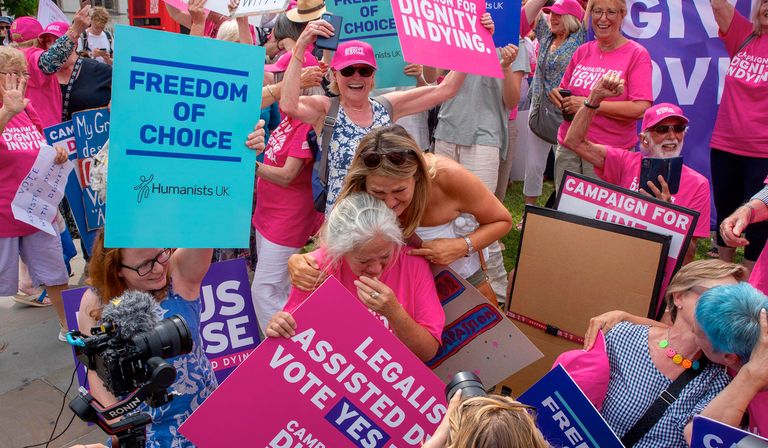Mark Mardell has reported on all aspects of Kim Leadbeater’s Terminally Ill Adults (End of Life) Bill and its passage through parliament. He has also examined how assisted dying works in other jurisdictions, speaking to campaigners, politicians and medical experts on both sides of the argument. The following interview took place a few days after the bill passed its third reading in the House of Commons.
Emily Lawford, commissioning editor: Mark, the bill passed its third reading on Friday. Did you expect MPs to back it—and by such a close margin?
Mark Mardell: I didn’t think it would be that close actually. I did think it would pass. The first thing that day was a particular vote on an amendment which really would have wrecked the whole thing. And that was voted down quite convincingly.
Emily: You’ve been doing this blog for a while for us—what are your personal views on the principle of assisted dying?
Mark: My personal views on the principle are that it’s fine. I’ve always held that opinion rather loosely, without really interrogating myself or anything about it, but I’ve always thought that if people wanted to die who were ill, that’s fine. And I once joked with my eldest son that if I ever came to a stage where... I didn’t really spell out what that would mean, but he should just plonk me on a beach in Thailand with a big spliff and enough opiates to kill me. That was rather thoughtless, because it would end with him in prison not only for drug smuggling, but also murder because assisted dying isn’t legal in Thailand. But anyway, that was my attitude before I came to this blog.
Emily: And how have your views changed over the course of doing the blog?
Mark: I think they’ve got less liberal in a sense—not my personal views, but it’s become much clearer to me what is acceptable politically. So I started off, along with my colleague on [the Parkinson’s advocacy group] Movers and Shakers, Nicholas Mostyn, saying, “It’s ridiculous to have it just for people with terminal illness. It has to be widened, and it has to be for people like me—I’ve got Parkinson’s. Assisted dying has to be for people with intolerable suffering, not just the terminally ill.”
But actually, when I sat down and watched the second reading, I realised that MPs wouldn’t swallow that, because they felt there weren’t enough safeguards there. They would say people would apply for assisted dying and just pretend they were having intolerable suffering. So I’ve accepted that this bill is drawn very strictly for that reason.
It’s in the title—the Terminally Ill Adults (End of Life) Bill. So it’s very clear that it’s only for terminally ill people and I don’t think it can be expanded in the way that other bills have been expanded in other parts of the world.
The Canadian bill was expanded because the judges came in. People like me could say to the judges, “Look, I have a human right not to suffer intolerably”. This would be much more difficult under British law.
Now, there are Tories who have an atavistic fear of the European courts and they worry they could expand the bill. But everything I’ve read suggests it couldn’t be. Of course, anything can change. You could get a new bunch of MPs who decide to bring a new bill through and that could change it.
Emily: Is it likely that MPs will bring another bill through or do you think this is probably it for the foreseeable future?
Mark: I think that’s it. Kim Leadbeater has been through a heck of a lot and I think it’s been a lot of personal pressure. I think the government hasn’t done very kindly by her, leaving it in her hands, and I don’t think they have behaved well.
I can understand with all the other pressures on them assisted dying wasn’t exactly at the forefront of their minds. But they made it a private member’s bill and I don’t think that was the right way to do it necessarily. And I don’t think anybody’s going to touch this again.
Emily: How do you think the parliamentary process has gone so far? What do you think about how the debates have been run?
Mark: I think it’s been absolutely fine, really. Opponents will use any stick to beat the bill with. There’s been a lot of criticism along the lines of, “We didn’t have enough time and I didn’t get to speak.” Oh boo hoo, you didn’t get to speak. Most MPs don’t get to speak on most government bills. This has had more time than any other private member’s legislation that’s been before the Commons. That’s not the problem.
I do think the bill needed more preparation. If it had been a government-inspired bill in the first place, you’d have had a process where people had options before them and they could have decided what the bill would look like. And there’d be much more deliberation.
I wouldn’t want to deny other people the choice
Emily: Who have you spoken to who’s come the closest to changing your mind in this debate on either side?
Mark: I had largely dismissed the arguments against the bill as religious arguments. I don’t mean people don’t have a right to have religious views, but I don’t share them so I don’t think they should impose their will on me. What annoyed me about that was that opponents didn’t say that it was because of their religious views. Then I spoke to several disabled campaigners who clearly weren’t motivated by religion and weren’t religious at all. And it shook me that they felt vulnerable because of this.
Now, I don’t think they are vulnerable. But the fact is they still feel it. During Covid, occasionally people who were disabled did find themselves designated as “do not resuscitate” when they had no desire to have that label put on them. I think a lot of them feel that they are seen as -second-class citizens, seen as people who should want to kill themselves. I think as much protection you can give those people should be given—and I think that is in the bill.
Emily: One of the most controversial changes made to the bill was dropping the requirement for a High Court judge to sign off assisted deaths and replacing it with a panel of experts. What do you think of that change?
Mark: It was one of the reasons the margin was lower in the second vote. But whether or not a judge was the correct person, they wouldn’t have time to do more than rubber-stamp the application. So it was right to change it. I think an expert panel—a psychiatrist, a legal expert, social workers etc—is much better.
Emily: Which countries do assisted dying best? Do some countries get it wrong?
Mark: I think allowing assisted dying for people who are mentally ill is probably wrong. And in Quebec, they permit forward directives—meaning when you can ask in advance for an assisted death once you are no longer of sound mind. The trouble with that is people can change their minds. I think that provision is wrong. I think the reason Canada has become a poster boy for the opponents is partly because of things like that where it has gone too far because of judicial interference.
Emily: You’ve mentioned in your blog that people with Parkinson’s like you won’t be eligible for an assisted death under this bill, as you wouldn’t be classed as terminally ill. Could you explain why you support the bill anyway?
Mark: I wouldn’t want to deny other people the choice because I wouldn’t have it. I don’t think that’s right.
Emily: And finally, what do you think will happen now? How likely is the bill to pass the Lords?
Mark: I think it will pass the Lords; I think it’ll have a tough passage. There are probably things that need improving and the Lords is the right place to do that. There will be those who try to destroy the bill, and I guess that’s their prerogative. But it would be politically unwise if they were seen to oppose it and to bring it down.














